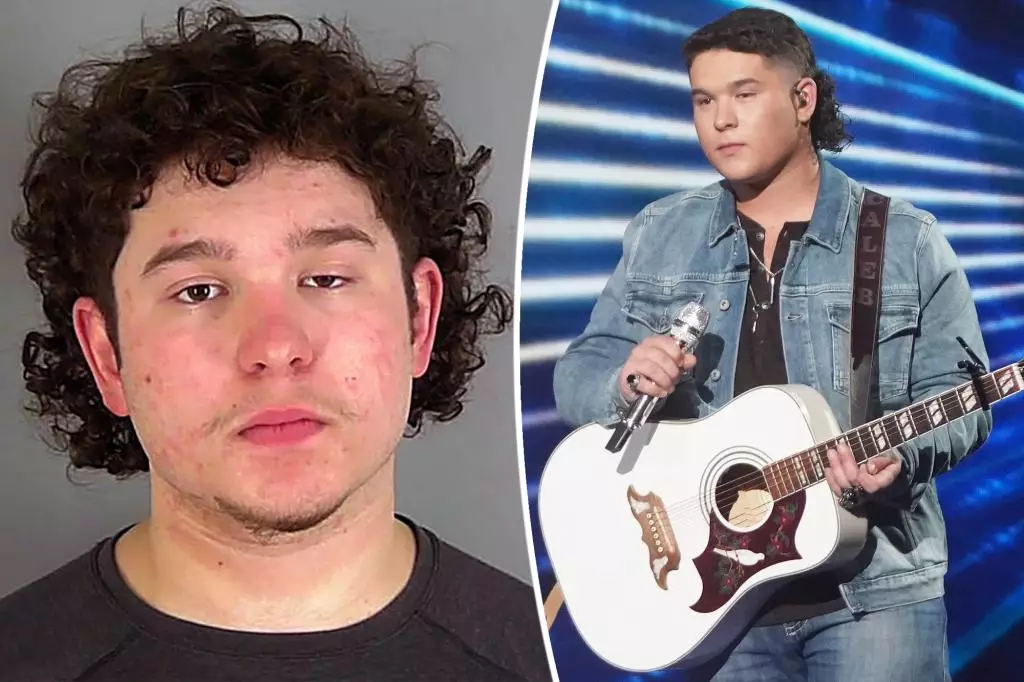Caleb Kennedy, the former contestant of “American Idol,” recently faced the music after a tragic incident that resulted in the loss of life. Kennedy was sentenced to eight years in prison for his role in a fatal car crash that occurred in February 2022. Initially handed a stiffer sentence of 25 years, his punishment was significantly reduced following a guilty plea to a felony charge of driving under the influence. This case raises critical questions about accountability and the societal implications of reckless behavior, particularly among youth.
Driving under the influence has always been a serious offense, with legal systems designed to deter such conduct. The crash not only claimed the life of 54-year-old Larry Duance Parris, but it also irrevocably altered the trajectory of Kennedy’s life—a rising star whose moment in the spotlight ended prematurely. Upon further examination, Kennedy’s case reflects a complicated tapestry of youthful indiscretion, mental health issues, and the societal responsibility we all hold in preventing tragedies like this.
Caleb Kennedy’s reduction in sentencing from 25 years to 8 years—and his eligibility for credit for the nearly three years served prior—has sparked significant debate. Supporters of harsher penalties argue that such cases must serve as a deterrent to others. In contrast, Kennedy’s attorney, Ryan Beasley, defended the outcome as fair, highlighting the lack of prior offenses and Kennedy’s age at the time of the crash. The notion that a “weird reaction” to prescription medication and cannabis played a role raises uncomfortable questions about drug use and societal norms surrounding it.
The legal leniencies extended to young offenders often bring to light a dilemma: how do we hold individuals accountable while also considering their age and potential for rehabilitation? The transformative justice approach advocates for addressing the underlying issues (such as substance abuse or mental health) alongside punishment, which in Kennedy’s case involved mandated counseling for both mental health and substance use. This balanced approach might signal an opportunity for personal growth and redemption, but it still leaves a lingering sense of injustice for the victim’s family.
Kennedy’s rise to fame as a participant in “American Idol” adds another layer of complexity to this narrative. Fame can often cloud judgment and lead to consequences that are not fully understood by young stars. Kennedy’s previous controversy, which involved being filmed in a Snapchat post alongside an individual wearing a Ku Klux Klan hood, indicates deeper issues at play. The public reaction to that incident was swift, culminating in his departure from the show and bringing the often troubling intersection of celebrity culture and accountability into sharp focus.
Kennedy’s acknowledgment of past actions and his statement of remorse indicate an awareness of his responsibilities. However, the interplay between celebrity status and personal accountability remains a crucial conversation. Can there be a responsible way to guide our youth in the limelight, and how can society better prepare them for the potential pitfalls of fame without compromising their mental health?
While Caleb Kennedy faces the consequences of his actions, it is vital for society to shift its focus towards healing and prevention. The Parris family deserves compassion and support, as their loss is irreplaceable. Kennedy’s journey many not only be about serving time, but also about understanding the ripple effects of his decisions.
Substance abuse and impaired driving are pressing issues that society confronts today. Efforts must be directed towards comprehensive education and resources focused on preventing reckless behavior, particularly among young people. Schools, communities, and families should engage in constructive conversations about the dangers of substance use and irresponsible behavior behind the wheel.
Ultimately, the sentencing of Caleb Kennedy serves as a sobering reminder of the consequences of reckless decisions and the importance of vigilance in protecting both the individual and the community. As he begins his sentence, the real challenge lies in ensuring that lessons are learned—not only by him but by others watching from the sidelines.

